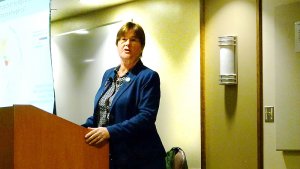
Associate Dean of the School of Science, Catherine N. Duckett, Ph.D., presented a talk on Jan. 27 for the “Science Mondays Lecture Series,” a joint effort of Brookdale Community College and the New Jersey Sierra Club’s Jersey Shore Group, to spark conversations about science.
The panel, titled “Climate Effects on Life on Earth: Is it Really an Emergency?” focused on the consequences that climate change will inevitably have on human civilization. Duckett spoke to an audience of roughly 90 people, including Brookdale students and members and guests of the Sierra Club, on how climate change has created a state of emergency for all living creatures.
“Humans have enjoyed a very stable climate for the last 9,000 years,” Duckett said. “However, because carbon dioxide emissions are now heating the earth more quickly than at any time in the last 3 million years, climate is changing faster than plants, animals and ecosystems can adapt.”
According to Duckett, the effects of climate change not only disrupt sea levels, but will also cause disruptions to human food systems by changing ecological interactions between plants and their pollinators. Duckett explained, “Negative impacts are being felt throughout aquatic food chains, especially species with hard shells like oysters, clams, shrimp, krill, and all the things that feed on them like whales, sea otters, walrus, seals, and tuna.” Duckett also cited the vast swaths of kelp forest that are disappearing off the coast of California, the recent death of 30% of flying foxes from the severe heat in Australia in 2018, and the 40% of all saiga antelope dying from a heat-mediated pathogen in 2015.
Duckett’s talk explored marine ecological relationships as well as land-based systems.
“Ocean acidification is a major side effect of carbon pollution and oceans have about 30% more acid than before the industrial revolution. This acidity has wide-ranging effects on fish behavior and on the ability of shelled creatures to make shells.” Duckett outlined how the U.S. Pacific Northwest oyster fishery has suffered from the oyster spat’s inability to make an initial shell and consequently metamorphose into a small oyster from a larva. Impacts on mollusks also negatively affect salmon fisheries because a large part of the diet of salmon are small pelagic mollusks. Scientists have shown that global warming and ocean acidification is already reducing salmon weights by as much as 30% in some areas, according to Duckett.
Given the extensive bushfires raging all across the continent of Australia, Duckett spent a few minutes documenting how unusual the situation is. “Currently, Australia is experiencing [a warming of] 2.5 degrees Celsius over pre-industrial warming and with it, catastrophic ecological consequences. Wildfires are raging set both by lightning and accidents as inconsequential as the landing lights of a helicopter touching dry brush.” Duckett noted that more than one billion wild animals and 250,000 domestic animals have died in the fires and 10,000 have dropped dead just from hot weather.
Duckett encouraged listeners to talk about climate change with their friends, family and associates, something most Americans don’t do, according to the Yale Center for Climate Change Communications. Duckett cited the study, which found that while most Americans support proven solutions to climate change such as renewable energy, tree planting and research for greater energy efficiencies, the conversations aren’t taking place.
According to Duckett, there are several reasons for this: “One is fear of giving offense because in some circles climate change is seen as a political issue rather than a scientific fact. Another reason is the mistaken idea that climate change is only a future threat that is not impacting people now, which it is—people are less interested in hypothetical problems. A final reason is fear of bringing up a negative, sad, or scary topic. So far, the climate futures discussed in the media, with the exception of the Green New Deal, which is blatantly political, are not very positive,” Duckett noted.
“I am trying to be as creative as possible in the classroom and using active lessons to help students make meaning for themselves out of this complex topic that is negatively impacting their lives now and will completely upend their future lives. I would like to see clear communication that climate change is a current threat to every aspect of our lives and livelihoods. We urgently need legislation giving incentives to people, corporations, and government to reduce carbon emissions.”
Duckett closed by reminding listeners that their voice is their vote, urging attendees to use the resources of organizations like the Sierra Club to provide them with information on political candidates and legislation regarding the environment and climate.
